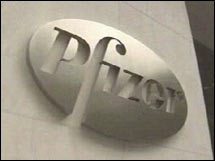|
Pfizer needs more drugs World's biggest drugmaker launches Exubera, but needs more new products to grow. NEW YORK (CNNMoney.com) -- The world's biggest drugmaker is launching a potential blockbuster today, but it's going to take more than that for the company to pull out of its rut. Pfizer (down $0.01 to $22.41, Charts) is launching Exubera, the first inhalable from of insulin, and some analysts believe it could someday total $1 billion in annual sales. That's good news, right?
But Pfizer's stock price is down 4 percent year-to-date, despite a rally early in 2006, and analysts project only slight growth when the New York-based drug giant reports second quarter earnings on Thursday. Analyst consensus expects 2 percent sales growth for the second quarter, with 4 percent earnings-per-share growth, according to Thomson Financial. "They're sort of in a trough right now where it's very difficult to grow," said Jon LeCroy, analyst for Natexis Bleichroeder. "Even Pfizer calls it a year in transition." "This year was not expected to be a year where they were going to grow," said Barbara Ryan, analyst for Deutsche Bank North America, who added that Pfizer is "on track" to meet its 2006 earnings goal of about $2 per share. But to bring the company back to significant growth Pfizer needs more than one blockbuster - it needs more new drugs. The company's biggest challenge is the competition from generic drugs - a problem faced by other Big Pharma outfits as well. On June 30, Pfizer's patent ran out on Zoloft, the antidepressant with the household name that totaled $3.3 billion in 2005 sales. In 2007, Pfizer is scheduled to lose patent protection on two other blockbusters: blood-pressure treatment Norvasc, which had $4.7 billion in 2005 sales, and allergy drug Zyrtec, with $1.3 billion in sales that year. Pfizer is cutting $4 billion worth of costs to offset these patent losses, but it's not enough. What Pfizer really needs are new drugs to replace the outgoing blockbusters. Exubera sales are only expected to reach $90 million during its debut year of 2006, but they could eventually peak at $2 billion annually, according to projections from Deutsche Bank's Barbara Ryan. And Pfizer does have other new drugs that could eventually contribute billions of dollars in revenue. Annual sales for its new cancer drug Sutent could reach $1 billion annually, according to Ryan, while annual sales for Lyrica, a new nerve pain treatment, could hit $900 million. Lipitor, the threatened giant? The good news is that Pfizer still has five or six years worth of patent protection on cholesterol-cutting Lipitor, the world's top-selling drug with $12.2 billion in 2005 sales. David Moskowitz, analyst for Friedman, Billings, Ramsey, projects 4 percent sales growth for Lipitor in the second quarter, even though prescriptions declined more than 2 percent during that time. How did Pfizer do it? By increasing the price, said Moskowitz. In a recent note Moskowitz said that he believes Lipitor sales "will remain resilient," driven by price increases, growth in the cholesterol-cutting market, and rising use of the drug thanks to Medicare Part D coverage, which began at the beginning of the year. But some analysts fear that Lipitor sales are being undermined by competition from a generic form of Zocor, a Merck (up $0.22 to $36.37, Charts) blockbuster that had $4.4 billion in annual sales but lost patent protection in June. Pfizer insists that its product Lipitor is different from Zocor. To help differentiate its blockbuster from the competition, Pfizer is combining Lipitor, which lowers LDL, or "bad"cholesterol, with the experimental drug torcetrapib, which raises HDL or "good" cholesterol. Al Rauch, analyst for A.G. Edwards, has said that the torcetrapib-Lipitor combination, if approved by the Food and Drug Administration, could add $8 billion to Pfizer's annual sales. But even if this drug combo does live up to multi-billion dollar expectations, it won't make a dent in this year's earnings. Pfizer won't file the drug to the FDA until next year according to Deutsche Bank's Ryan. Pfizer's hunt for new products continues, and it has money to spend on acquisitions thanks to its $16.6 billion sale of its consumer health division to Johnson & Johnson (Charts). Pfizer could use this money to buy or license experimental products from biotechs, or to buy the smaller companies outright. Like other members of Big Pharma, Pfizer used to discover and develop most of its products in-house, but this is changing as the cash-rich drugmaker prowls the market for cash-poor biotechs with promising pipelines. Indeed, Pfizer's management intends "to derive 30 percent of its future revenues through outside product opportunities," according to Deutsche Bank's Ryan. Whether or not that will be sufficient to make up for its own weak pipeline remains to be seen. The analysts interviewed for this story do not own shares of companies mentioned here, but Deutsche Bank does own shares of Pfizer and seeks business with it. Related: New salvo in cholesterol drug war |
|

